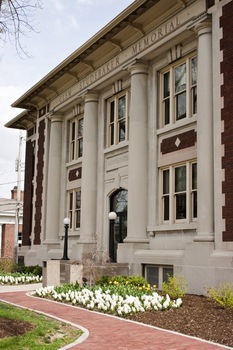
DePauw student media report that they are experiencing greater difficulty accessing University administrators in recent weeks, despite assurance from the vice president of marketing and communications, Deedie Dowdle, that no policy changes have yet been made.
Student media leaders, including senior Kate Whalley, WGRE FM 91.5 station manager, said in a statement, “we are becoming increasingly aware of this shift and have experienced difficulty contacting certain University officials.”
Media leaders from both The DePauw and D3TV also report difficulties accessing administrators. “I understand that an administrator could receive a bunch of requests for interviews,” said Editor-in-Chief of The DePauw, junior Brooks Hepp. “However, this is a learning experience that we’re getting through student media… It isn't preparing us if we are going to the same source for every story.”
According to members of student media, over the last several weeks more and more requests for comment from administrators, who were once open to talk, have been either redirected or directly answered by Ken Owen, special adviser to President Mark McCoy. This has led some students to assume that a change has already been implemented without student media being notified.
Over the last several years, DePauw student media organizations have had direct access to University administrators when it came to requesting interviews and asking for information. Now, student media are being referred to a single source who will either answer their questions or redirect them to other sources.
“We want to make sure that the information (given to student media) is the best,” Dowdle said. She thought redirecting media questions to one person in the marketing and communications department “might be better and less chaotic.”
Owen said he was approached by Dowdle about a possible change after several administrators discussed how often they were being asked for interviews from student media organizations.
Dowdle said that plans to meet with the faculty advisors for The DePauw, WGRE and D3TV have been scheduled for next Monday.
Some other universities, such as Indiana University, with over 110,000 students, have open communication between student journalists and administrators, with media and public relations advisers to the University only being contacted when needing information on finding sources. This is according to Editor-In-Chief of Indiana University’s student newspaper, The Indiana Daily Student, Carley Lanich.
“We don’t often have difficulty in reaching out to different administrators,” Lanich said. She said if student media at Indiana University had trouble with contacting university administrators it “wouldn’t look great from a PR standpoint.”
Denison University’s student newspaper, The Denisonian, also has open communication relationships with its administration, according to Editor-in-Chief of The Denisonian, Rachel Epstein, in an email. Denison is a Division III private university closer in size to DePauw and a member of the Great Lakes College Association.
Owen and Dowdle say that a change in how student journalists communicate with administrators will help everyone and create a less hectic environment. In fact, Owen said, this was the procedure in previous years and is current practice for external media relations at DePauw.
“This is the way the world works,” Owen said. “It’s not like we’re shutting down the valves of communication...You guys [student media] have to go after us, but get your facts straight.” Owen said he makes himself available to student media and said it is “my job to kind of make sure you guys [student media] are taken care of.”
However, Frank LoMonte, former executive director of the Student Press Law Center, disagrees. “There are all sorts of problems to set up an administration relations office as a choke hold for information,” LoMonte said, adding that the lack of access to administrators is not only bad for student journalists, but bad for the public as a whole.
“A policy that results in student journalists getting less direct access with administration means that stories are going to be weaker,” LoMonte said. When vetting potential college graduates for positions, if he notices that their work contains many quotes from university media representatives, then the student’s work is not as readily considered.
“It’s disadvantaging your students in their future careers,” LoMonte said. “There is really no good reason to do this.”
LoMonte will be on campus for a presentation titled "The New Transparency Movement: Will Colleges Lead or Lag?" on Tuesday, April 3rd at 4 pm.
Miranda Spivack, DePauw’s Eugene S. Pulliam distinguished visiting professor of journalism, agrees with LoMonte. “Real reporting means going directly to the sources who have first hand knowledge, not through third parties,” Spivack said. “I’m surprised that in a small community like DePauw that the administration wants to work through press requests.”
Despite this, Spivack said that “For aspiring journalists at DePauw this may be a good lesson” because it’s teaching them how to fight for a story

